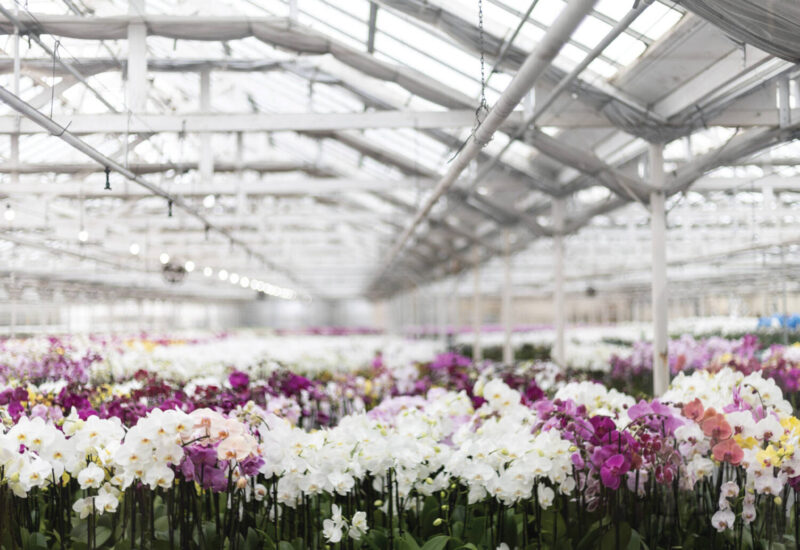
Grower Success Stories: Historical horticulture
Joop Overgaag started Westerlay Orchids 47 years ago, and it has grown into an 800,000-square-foot greenhouse enterprise. Today, Joop’s son Toine is president of the company and has transformed the family business into an orchid empire.
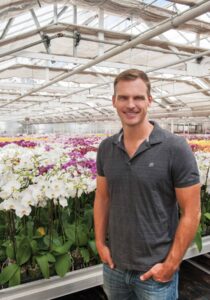
While Toine grew up around the family greenhouse business, he embraced a different path of study in college. Having first gone to school for economics and later obtained his master’s of business administration, Toine found his way home. Together, Joop and Toine saw an opportunity to forge a more sustainable path for the longevity of the business.
“My dad had the vision to start looking for something else, and it was his thought of: ‘What’s something that’s hard to do, that other people can’t just jump into?’” said Toine. “Let’s do something hard and let’s do something that you can’t bring in from abroad. Those were really the two guiding factors.”
FAMILY FIRST
The Overgaag family has deep roots in their Dutch upbringing. The multi-generational operation began when Toine’s grandfather started growing and selling tomatoes in the Netherlands. When Joop took over the business, he switched to chrysanthemums and cut flowers. In 1978, Joop immigrated with his wife and four children to the U.S. to continue the family’s greenhouse legacy.
Worried the family name Overgaag might be a mouthful, he decided to name the business after the major agriculture auction house in the Dutch hamlet of Westerlee, Holland, where his father once sold tomatoes.
In the 1990s, a staff of 50 maintained 600,000 square feet of innovative, all-hydroponic production and distributed millions of cut flowers annually. Eventually, international competition began to impede Joop’s cut flower business, so he and Toine developed a five-year plan to transition from cut flowers to the production of potted orchids on a commercial scale.
“The market (was) almost a hobbyist-level thing, but the technology changed to the point where you could grow it at scale,” Toine said.
Today, that production has resulted in an operation of 150 staff members and 4 million orchids sold to a supermarket customer base across the western third of the U.S. and Canada.
TRUSTWORTHY AND TRENDY
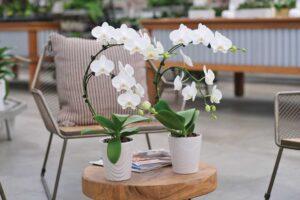
Westerlay Orchids is committed to remaining true to its customers while continuing to grow.
“We’re reliable, and that’s the strength of us as a business. We produce the vast majority of our product; that’s a year and a half to grow the base product,” Toine said.
He can effectively plan for which colors will be needed for each holiday or season, keeping Westerlay Orchids relevant all year.
“We’re controlling it all the time, so we’re able to plan. When we commit to something, we’re always able to make that commitment for our customers,” Toine said.
Annual trips to the Netherlands allow for a “boots-on-the-ground” research approach that has helped Westerlay Orchids stay at the forefront of production and technology.
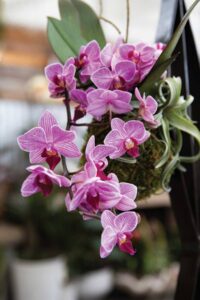
“The Wave is an example of something that we saw a couple of years ago, in small numbers there, and now (we’ll) produce 100,000 this year,” Toine said.
SUSTAINABLE SOLUTIONS
Joop built the greenhouses at Westerlay Orchids in 1978. A lot has changed since then within the company and the world’s climate.
“The actual structures are outdated; they cost us extra labor (and) energy,” Toine said. “We are about to launch a project where we will install dehumidification units in all of our greenhouses. It’ll allow us to really control the humidity levels up to 10% lower than they would be.”
Plants will grow better and reduce disease pressure, and with the dehumidifiers pulling the moisture out directly, they will be able to keep the greenhouse totally sealed. This means excess heat isn’t escaping, thus less energy is used to heat the tropical plants.
In addition to its existing solar panels, Westerlay Orchids is on the verge of trialing a new concept: greenhouse glass panels with solar properties.
“We’re going to be putting up a couple hundred panels of glass that have solar embedded in them,” Toine said. “The idea would be that you could have panels that would create, like, 30% to 40% electricity, and transmit light.”
There’s a bigger-picture sustainability aspect he is proud to be a part of.
“We’re the first orchid grower in the U.S. to participate in the Dutch program MPS (Mileu Programma Sierteelt), which is an environmental project for horticulture,” Toine said. “You are voluntarily audited by this (non-government agency) to look at your chemical usage, carbon usage, water usage, your recycling, and a lot of other processes, and then you’re graded against all your peers across the world.”
While in Europe this certification is essentially required to sell in major retailers, the U.S. doesn’t have anything similar.
CORE CONNECTION
Pride, support, responsibility, and improvement are at the root of Westerlay Orchids.
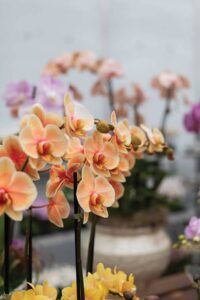
“Set the vision, set the values, and get alignment around them. Everybody knows what our core values are, and everybody agrees and points in that same direction,” Toine said. “Everybody here is proud of what we do. We’re focused on creating a beautiful product and taking care of our customers. We’re supportive, so if a teammate needs help, we’re collaborative. We’re responsible for the work that we do, and we’re improving (and) always trying to get better.”
When the COVID-19 crisis hit, Westerlay Orchids’ customer base had to make a tough decision.
Toine said supermarkets the company served cut all floral orders as consumers focused on purchases such as canned goods and toilet paper. In a time of uncertainty, Toine wanted to do something positive.
“We came up with the 100,000-orchid giveaway,” Toine said. “We started packing trucks full of orchids and reaching out to hospitals and assisted living places. (Medical staff were) working like crazy trying to keep us all safe, and the folks in assisted living were totally isolated from their loved ones. We wanted to show our support,” he said.
That experience showed Toine how Westerlay Orchids brought people closer together when the world encouraged them to be six feet apart.
“People are connecting with each other through these orchids. From that evolved this idea that we are in the connection business,” he said. “People have stories around plants, and I think that’s really cool we get to be part of that. – Every orchid has a story.”








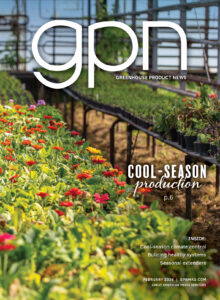
 Video Library
Video Library 


















